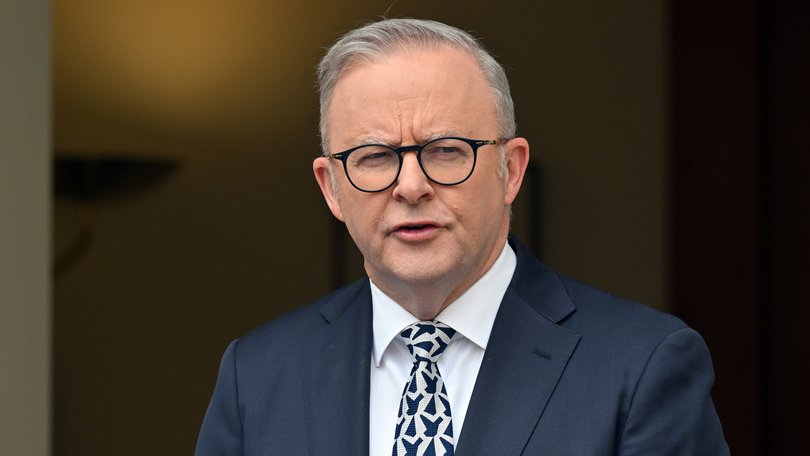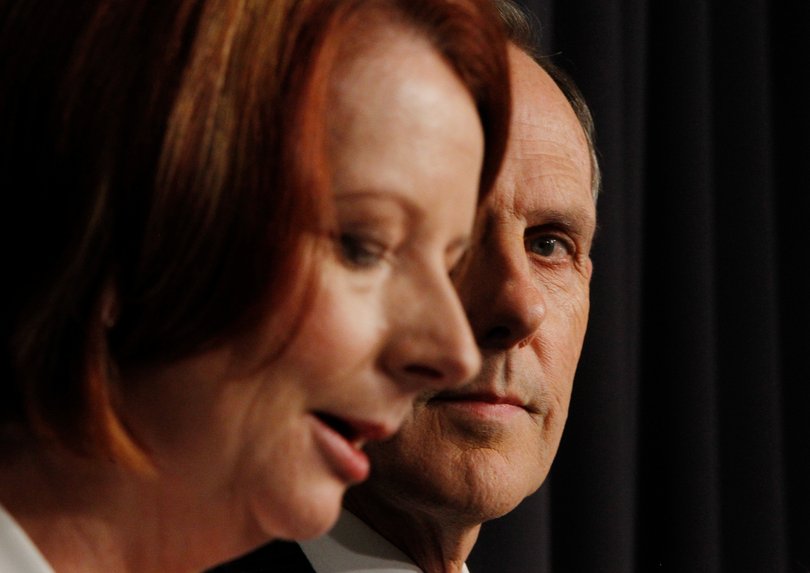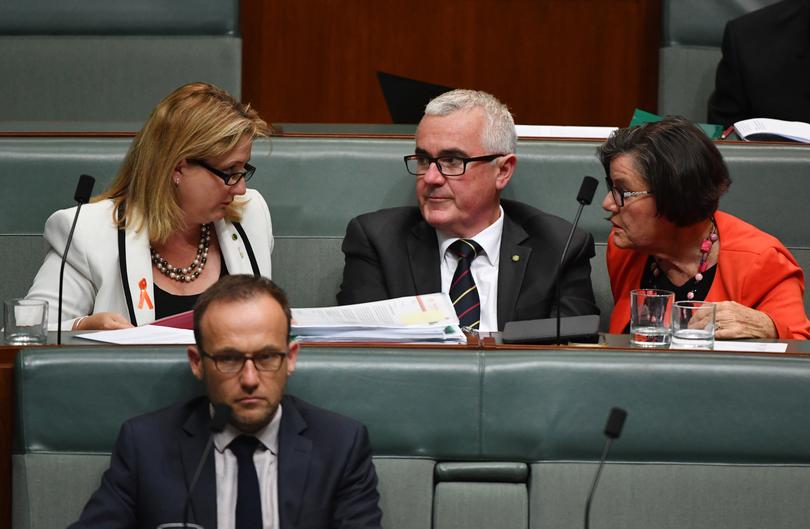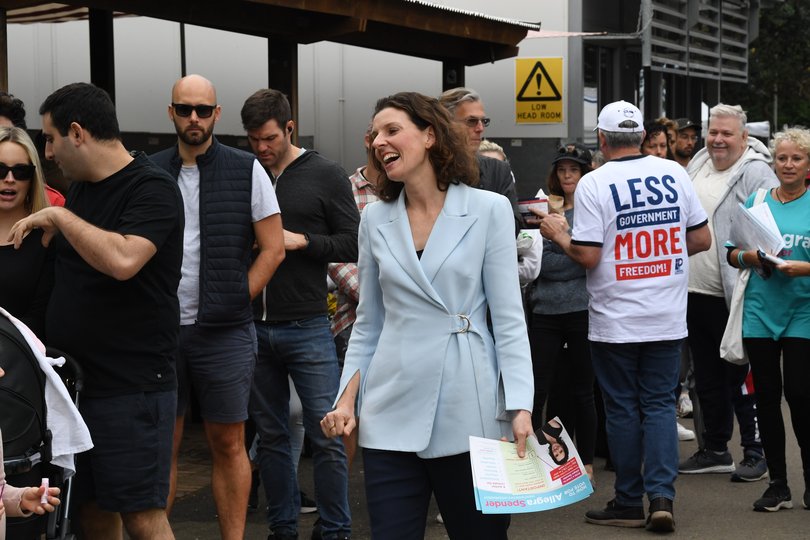Australian politics: What would a hung parliament bring after opinion poll chaos?
If opinion polls are to be believed, voters will deliver something Australian politics has experienced just twice in the past 114 years at the next Federal Election. What would it entail?

If opinion polls are to be believed, voters will deliver something Australian politics has experienced just twice in the past 114 years at the next Federal election — a hung parliament in Canberra.
Labor’s hopes of retaining its two-seat majority are waning as support for Prime Minister Anthony Albanese continues to erode, with the latest polls putting support on a two-party preferred basis at 50-50.
Peter Dutton’s Coalition would need to claw back more than 20 seats to sweep back to power in its own right — an unlikely turnaround after just one term in the wilderness of Opposition.
Sign up to The Nightly's newsletters.
Get the first look at the digital newspaper, curated daily stories and breaking headlines delivered to your inbox.
By continuing you agree to our Terms and Privacy Policy.The scenario most pundits are predicting involves a bruised and fragile Labor Government forced to rule with a Green and teal-tinged crossbench — bringing with them their own demands and wish lists, and potentially forcing Mr Albanese into some uncomfortable deals or negotiations.
Some argue that would be a recipe for political chaos and dysfunction — and potential economic catastrophe for WA.
The Sunday Times examines the prospect of a hung parliament, including the king-makers who will make or break it.
Who you gonna call?
If neither Labor or the Coalition are within reach of a 76-seat majority on election night, Mr Albanese and Mr Dutton will need to hit the phones.
In 2010, with the major parties locked on 72 seats, Prime Minister Julia Gillard secured agreements with the Greens and three independents — Andrew Wilkie, Tony Windsor and Rob Oakeshott — to prop up her minority government.
Mr Albanese says he is only interested in governing in majority, refusing to even countenance the possibility of doing deals with the crossbench.
But political observers say if Labor falls into minority, it would be inconceivable for him not to seek assurances that guarantees he can pass Budgets and survive no-confidence motions.

The Greens hold four lower house seats and are likely to be the king-makers in a power-sharing Parliament.
The party is starting to compile a wishlist of balance-of-power policy demands, which so far includes putting dental into Medicare and building 1000 free health clinics.
The big-spending policies could be paid for, the Greens say, with a $514 billion tax grab on corporate profits that WA business warn would tax the State’s miners into “oblivion”.
A minority Labor government would face relentless — potentially irresistible — pressure to block new coal and gas projects, add a “climate trigger” to nature protection laws, commit to higher emissions-reduction targets, abolish negative gearing and cap rents.
Shadow Treasurer Angus Taylor has warned the Greens would “wreak havoc” in a hung parliament.
Labor has firmly ruled out adopting the Robin Hood-style tax grab and rubbished the Greens’ pie-in-the-sky ideas, an ominous sign about the potential for any deal.
But as the negotiations for the last hung parliament proved, a lack of agreement on controversial policies doesn’t make a deal impossible.
Then-Greens leader Bob Brown couldn’t convince Ms Gillard to immediately commit to a carbon tax or a path forward to legalise gay marriage.
But the Greens agreed to back Labor after securing a dozen other concessions, including a multi-party climate change committee that ultimately recommended the carbon price.
A young Adam Bandt was the Greens’ only lower house MP at the time. Now party leader, Mr Bandt is open minded about how the Greens would approach the next hung parliament.
“We’re willing to be cooperative and to deliver a stable and effective and progressive Parliament,” he said in an exclusive interview with The Sunday Times.
“We’re not pressing for spots in cabinet. What is more important for us is to get outcomes for everyday people. In terms of how that works, all the options would be on the table”.
The other crossbenchers — including teal independents like Curtin MP Kate Chaney — have been vocal but powerless in the Labor-controlled lower house this term.
That would change in a hung parliament, where the fate of laws, or even who forms Government, could rest in their hands.
The Sunday Times asked crossbench MPs which major party they would support to form Government (assuming both are in contention) and what concessions they would push for in exchange.

Member for Mayo Rebekha Sharkie said voters in her historically conservative-leaning South Australian seat would expect her to speak first with the Liberals, although she stopped short of committing to supporting them.
Liberal sources said Ms Sharkie and larrikin independent Bob Katter would be the most likely MPs to side with the Coalition.
In a statement to The Sunday Times, Mr Katter declared he had no allegiance to either party.
“I have great respect for Peter Dutton and I have always been a close friend of Anthony Albanese, but I’m, not interested in either of them — I’m interested in the millions of people in North Queensland,” he said.
Mr Wilkie — who represents the Tasmanian seat of Clark — won’t sign an agreement with either party after being burned last time around, when Ms Gillard walked away from promised pokies reform.
Indi MP Helen Haines said she would “never” do a deal that bound her to vote a certain way all the time, instead committing to treat every piece of legislation on its merits.
While the teal independents hold traditionally Liberal turf, Liberal sources are sceptical any would would support a Dutton Government except, perhaps, Sydney-based MP Allegra Spender.
Ms Spender did not respond to questions from The Sunday Times.

But this week at the National Press Club she revealed she was open to supporting either side.
“It starts with, ’what are the numbers? What are the situations and what can you negotiate?’” she said.
“I am clear, I will work with anyone . . . in a minority parliament. We don’t know what a Parliament next time might look at.”
Ms Chaney also declined to comment about her intentions, leaving Curtin voters in the dark about which way their local member might lean in a hung parliament.
She has previously said she would look at the issues on merit and would not want to be tied to votes on particular areas.
Separately, Ms Chaney said this week she did not support “plonking skyscrapers into the suburbs” amid debate around how Australia should respond to the housing crisis.
“Plonking skyscrapers into the suburbs without adequate community consultation is not the way to win the hearts and minds for greater density — which we sorely need,” she said, echoing comments from fellow teals in Melbourne, Zoe Daniel and Monique Ryan, who slammed the Victorian Labor Government’s plans for high-rises in their electorates.
On Saturday, voting-record analysis by News Corp found the teal independents have effectively voted as a bloc over the past three months, including 20 times out of 21 in October.
In September, the teals voted the same way 24 out of 27 times, and in August, 12 out of 15 times.
Ms Spender also confirmed she will continue to accept political donations from Simon Holmes a Court’s Climate-200, which is not a registered political party.
Chaos or cooperation?
The 43rd Parliament was chaotic.
Ms Gillard was eventually knifed by Kevin Rudd, who went on to lose the 2013 election in a landslide defeat that begun a decade in opposition.
But despite the turmoil, the hung parliament was remarkably productive, passing 561 pieces of legislation — even more than John Howard achieved when he controlled both houses between 2004 and 2007.
The National Disability Insurance Scheme, Gonksi education reforms and early rollout of the National Broadband Network were among the major, lasting achievements.
While the carbon tax was eventually repealed, remnants of the Labor-Green climate agenda, including the Australian Renewable Energy Agency and the Clean Energy Finance Corporation, remain.
The independent Parliamentary Budget Office — a condition of the Gillard-Bob Brown deal — is used heavily by opposition parties, minor parties and independents to cost and model policies
Ben Oquist, who was Senator Brown’s chief of staff at the time, said, “You can have your views about the Gillard government, but you can’t say it didn’t pass legislation and get things done.”
Now a lobbyist with DPG Advisory Solutions, Mr Oquist said the decades-long decline in support for the major parties would deliver more hung parliaments.
“The electorate’s will needs to be respected,” he said.
“And if they deliver a hung Parliament, it’s kind of on everybody to make it work.”
